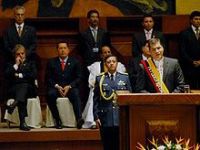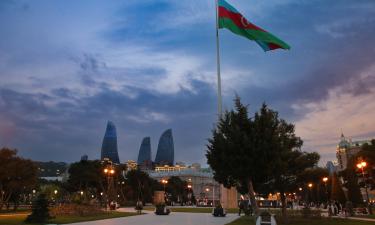Interview with President Rafael Correa: Part 2
This interview was conducted during the stay of Ecuadorian President Rafael Correa in Brazil, by Beto Almeida (Brasil de Fato, Telesur, TV Comunitária), Emir Sader (Sociologist TV Brasil) and Valter Xeu, Editor of Patria Latina, media partner of the Portuguese version of Pravda.Ru. Here is a synopsis of Part 2 of the interview.

Emir Sader - With weak political parties, the right wing media acts almost like a political party in opposition. This is a question of democratization, in which Ecuador has advanced greatly. What would be the model to follow?
President Correa - This is our main opponent. It is a huge struggle. The media in Latin America does not belong to the poor. They are in private hands, in the hands of the financial elite. In Ecuador, 90% of the media are in private hands. We have a national journal of the five major national journals. Local and regional journals are many more. We have two television channels, six or seven national channels. We rescued the national radio, but there are more than a thousand others. It's little, but now it's a case that the people win something. The media should be public, but it is in private hands. Communication is a right and a fundamental thing in the media. In the capitalist system the right of peoples is free and comprehensive communication, in direct opposition to the requirement of profits. Profit and right of communication going in opposite directions. The elites, however not only seek profits but naturally want power. We have a contradiction. The mass media, for the masses, is in private hands.
You can talk about restricting the political power, and in a certain way people accept. You can talk about restricting economic power, and even then they accept. But when it comes to putting any limits on the media power this is no longer accepted in any way. The attempt to require a certain balance in the presentations, a certain objectivity or neutrality, is immediately and strongly attacked as a serious act against freedom of expression.
In Latin America there is exceptionally bad press, about the lack of ethics, the concentration of ownership, the lack of professionalism, as well as well as political manipulations, and more, too.
Beto Almeida - To address manipulations in the monetary, financial, and social field, we have, for example, organizations like CELAC. However, there is in Brazil also a need for a journalistic true integration. What we have is a journalism disintegration. It has been the case of the World Cup. The World Cup was a failure? No it was not, but it was presented as a total failure. Important meetings and gatherings are discredited. The BRICS-UNASUR meeting was very important, and some treated it like it was nothing. Journalism tries to crumble, break, or silence, but we must have the ability to integrate, cooperate to build, and to believe in people's ability to achieve this direct social integration.
President Correa - Exactly. This attempt at social disintegration is a result of the media as a private business, with the purpose of profit in private hands. This is extremely concentrated. It is necessary to have more community media, nonprofit-making. In a natural way the requirement of giving profit goes in inverse relation to the right to information and media. The communication should be used as a means of society, as a public medium. When speaking in public, it means you are not only speaking of the central government.
Now the Constitution of Ecuador in relation to visual communication and media demands that the ratio is 1/3 the private sector in order to profit, one third the public sector and one third to the community without profit-making motives. It's a tough fight. Everything is very concentrated. The private sector has to go to one third in this relationship. This is one of the answers, not to disintegrate, but integrate. But this is only one of the answers, and there has to be done much more in order to reach a solution... But be prepared to hear that we are violating their freedom of expression.
Beto Almeida - There have universities for integration in Brazil, for example, UNILA constituted in the Lula period. Also there is ELAM-Latin American School of Medical Sciences in Cuba. This integral idea would now also be required in the printing industry?
President Correa - The biggest challenge we face is to win media power. This has strong defense mechanisms. Thinking of criticizing? Attack immediately with the "attack on freedom of expression".
Emir Sader - You recently founded a new university, based on the idea of "well known" common knowledge. What is the nature of this new project you are developing?
President Correa - In fact, we created four new universities. Which do you mean? I believe you refer to Ikiam [Regional University of Amazon], in the jungle. Unlike Brazil where the Amazon rainforest is quite far from the big cities, here in Ecuador, in three and a half hours, from Quito, you can be in the Amazon jungle, where Ikiam is located. We created this new university called Ikiam in the Shuar language, one of the many ancestral languages that have our country, it means "jungle", which is in the middle of a nature reserve of about 900 km2, for a university-level world, basically to meet the need for bioknowledge. So, I can assure you that there will be a unique and unrepeatable advantages in this university: biodiversity of bioknowledge.
Beto Almeida - We know that you like to talk about the role of NGOs because there are NGOs and NGOs .. Here we had a very eerie experience. Some NGOs are promoting events that promote violence to destroy public buildings, public facilities, subways ... In Venezuela, we know what happened ... the guarimbas [protests and blockades], with many NGOs funded by foreign foundations of rich countries they are acting for. But this is a new process that some call "social face of neoliberalism" ... because we are also experiencing it here in Brazil at the moment ...
President Correa - We have a huge problem here. This is a tactic of destabilization directed, performed by very violent means, which give attractive names that evoke in an automatic way, positive reactions. In Chile Pinochet lifted up the words of honor, democracy and freedom, but now it is being used in a consistent manner, as a strategy where violence, with nice names below as subtitles, presents a very brutal and even extreme way . All attention is needed here. These are social organizations, but ... Beware! This is a new strategy of infiltration and sabotage. These organizations are not governmental or anti-government, foreign government organizations are working to overthrow the governments of other countries that do not please them. Among the social organizations working honestly, there is an extremely high number of others, who work under that cloak to destroy other governments and advance the interests of the great powers, which are not subscribed to anything, do not commit and are not restricted, requiring all for themselves. Attentive - destabilization - defending the interests of the U.S. extreme right.
In this context then one must also raise the issue of NGOs of the left, requiring people not touch the natural resources. What would become of Venezuela without oil? What would Bolivia be without gas? What would be Ecuador? Not touching any of our resources would be suicide. According to certain segments of the far left we could not touch anything, but at the same time, both nationally and internationally, the far right would be enjoying here, as always, all the fruits. It has been in this context that many compositions of the extreme left do not understand or want to understand what it is governing a country. So we can defend ourselves, we have to use some of our resources. Sometimes organizations do more harm than good.
Beto Almeida - Mr. President. Thanks so much on behalf of TV Comunitária, TV Brasil and Patria Latina.
President Correa. Thanks to all and a big hug for Brazil.
Part I
Interview with President Rafael Correa: Historic Change in Latin America
This interview was conducted during the stay of Ecuadorian President Rafael Correa in Brazil, by Beto Almeida (Brasil de Fato, Telesur, TV Comunitária), Emir Sader (Sociologist TV Brasil) and Valter Xeu, Editor of Patria Latina, media partner of the Portuguese version of Pravda.Ru. Here is a synopsis of Part 1 of the interview.
Rafael Correa: "The relationship of the people with the power in Latin America is experiencing a moment of historic change"
It was a pleasant 40 minute conversation with the Ecuadorian President who has been in power since 2007, and said he intends to run for reelection in 2017. Correa was in Brazil to attend the UNASUR meeting, which brings together countries of South America, with the BRICS, comprising China, Russia, Brazil, South Africa and India.
The Ecuadorian president, who defends the existence of laws that restrict media power, also believes that, at present, there is underway in Latin America a "conservative restoration", which aims to end the cycle of progressive governments that emerged on the continent in recent years.
Beto Almeida - Mr. President. Thank you for receiving us here. Bringing you the greetings of Brazil with the recognition of the giant role that Ecuador has played, both in Latin America and the world. We came here with three journalists: 1) Valter XEU of Patria Latina, which was born after a meeting with Fidel Castro and several journalists and intellectuals in Latin America. This presentation was followed by the exclamation of the President who then said: - "of course, Valter Patria Latina." 2) I, Beto Almeida, president of Community Brasilia TV, which has a collaboration agreement with Telesur and he also represents the newspaper Brazil de Fato, linked to social movements such as labor unions, and the landless. 3) Emir Sader of TV Brazil, which was created at the time of Lula. Now we give the word to Emir Sader.
Emir Sader - President Rafael in your first presidential term you pointed to the relationships and differences between a unipolar world and a multipolar world. You would say we're coming out of a unipolar world and a multipolar one is driving us? You then say that there would be specific consequences for Latin America as a result of decisions taken at various meetings this week, such as the decisions of the BRICS? We'll be leaving here the unipolar era, after the Cold War, to a multipolar world?
President Correa - Muchas gracias. Firstly an embrace to Brazil with wishes for all the best of luck. Well, yes. I believe there is a change of season and a new cycle is approaching. Many progressives came to power in Latin America together with the debacle of national rights, which were then stunned by a great failure, which is connected to the failure of neoliberalism, and failed to adequately respond immediately. Here we have a change of seasons. These are profound changes. It is not only superficial reforms at stake. These are historical changes, with a major shift of power relations. It is a change from a bourgeois to a popular state. This change in Latin America has been consolidated through the governments of Hugo Chávez in Venezuela, Lula da Silva in Brazil, Morales in Bolivia, Bachelet in Chile, Tavares Vasquez in Uruguay, and the revolution in Ecuador.
However, you have to be careful. A new conservative cycle can try to reverse what has been gained. Much attention is needed. After the debacle that stunned them a new coordinate is now starting, and this at local, regional, and international levels. One must be very careful. I believe that Latin America will never return to past conditions, but it may lose much of what has been achieved. Much could be reversed.
After this there are building blocks, which is part of the process of change. Maybe. It also seems to me that with the unipolarity Latin America lost out too, since with unipolarity Latin America lost in importance, as compared to the time it was central in the game against communism.
But yes, there is a change of era, where the encounter between the blocks is a very important factor. Joining blocks is a good way to change the unjust order of the strongest, the order of hegemonic countries, financial capital, and worst of all in this context, the speculative financial capital. Take the case of Argentina. The United States could have broken it. Here there is also a need to ensure multipolar reality, which would allow greater participation, while avoiding at the same time, the eternal kind of danger that hovered over Argentina, for example. This requires the construction of solid blocks. This has to be done through blocks that can provide effective work. Brazil is great in itself, and could perhaps tackle the problem alone, but for countries that are small, and many are in Latin America, cooperation blocks, and the encounter between those blocks is required.
This is a reality that must be consolidated.
But for now, we would already be at the beginning of a new cycle? We'll have to wait to know the exact answer.
Beto Almeida - Mr President, the union of the BRICS with UNASUR is a very important step in the economic sector, also on an international scale, and here one could then claim international integration policy and/or anti-imperialist policy.
In your opinion, a coordination of economic union with this policy could be made? Our late Chavez has talked about a kind of Fifth International. Others speak of an anti-imperialist camp. What should be in their opinion, appropriate initiatives to sustain an economic fund coordination, and database development, which is being born with a policy coordination and/or anti-imperialist policy?
President Correa - We must be realistic. Alternating blocks are necessary and good, but here it is that not all countries have the BRICS bloc of progressive governments, and the same is true of UNASUR. We have to be vigilant, but it's a lot to be achieved through regional financial architecture that brings independence of traditional hegemony, what you are doing now with the BRICS, with its reserve funds to your new Development Bank, and the already established agreement between Brazil and China to trade and make transactions in their own currencies. The situation has changed a lot.
As has already been done it would not be an ideological union, but a union in practice, regardless of the ideological. However, this in itself is very important. It now follows that the work of political union has yet to be treated and in depth. What we have is a new consensus on new interests. With the BRICS has come a new financial architecture, which could prevent, for example, that all international financial transactions had necessarily to pass through the United States. BRICS is good. It can bring a less unjust reality.
Valter Xeu - Mr. President. During your term indices of health and education have grown a lot and there is a path towards eradicating poverty. How would you explain the case of Ecuador, a country with a small economy, when countries with greater resources failed?
President Correa - This is a political process. In the past, on this continent, Latin America has not developed, but the United States developed. We have a historical past, where more advanced civilizations were already here from the beginning, such as the Mayans, the Aztecs and Incas. Altogether it is a constellation of factors, but one of these factors is the class. We had a past where the social class of elites dominated us from the beginning.
But as for your question I can talk about the political process in Ecuador.
We had the dominance of a bourgeois state that we are moving to a popular state. The resources have always been here, e.g. oil, but let's say between the elite and the people had become, in the oil sector, a relationship of 4vs1, a relationship that is now leading to a ratio of 1vs4. In the oil sector we did renegotiations and had success with it. Nobody paid taxes. The resources have always been present, but are now used for the common good. So that would mean that it is a change in power relations, which now use for the greater good of the population and people power.
But here we find limits and external constraints. This is dangerous. We are attacked from all sides. Chevron could have broken Ecuador. We have to face restrictions imposed on us. It has here to do with excuses such as money laundering, terrorism, and others, but the rich do not bother with these restrictions, which apply to us but not to themselves. Look at the tax havens. Property rights...and the environmental goods, for example, they want to consume them for free. It is costly to restore the jungles. There are external pressures that require cooperation. In steps, we have to create an integration. We have to be efficient and create more resources. Socialism always spoke of the social aspects, but the efficiency was not discussed much. We now have to also mention the aspect of efficiency, together with the social aspects.
Subscribe to Pravda.Ru Telegram channel, Facebook, RSS!





